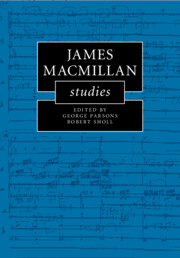Book contents
- James MacMillan Studies
- James MacMillan Studies
- Copyright page
- Contents
- Music Examples
- Tables
- Contributors
- Foreword
- Acknowledgements
- Introduction
- 1 The Struggle with Conviction: A Trio of String Quartets
- 2 Conflicting Modernities and a Modernity of Conflict in James MacMillan’s The World’s Ransoming
- 3 In Memoriam: James MacMillan’s Violin Concerto as Modernist Lament
- 4 Reincarnating The Tryst: The Endurance of a Simple Love Song
- 5 Exquisite Violence: Imagery, Embodiment and Transformation in MacMillan
- 6 Making the Familiar Unfamiliar: MacMillan’s St Luke Passion
- 7 MacMillan’s ‘Mission’ and the Passion Settings
- 8 A Cluster of Gathering Shadows: Exposition and Exegesis in Seven Last Words from the Cross
- 9 James MacMillan’s The Sun Danced: Mary, Miracle and Mysticism
- 10 ‘Shrouded in Doubts and Fears’: The Liturgical Music of James MacMillan
- 11 Containing Chaos? Aspects of Medieval Liturgy in James MacMillan’s Visitatio Sepulchri
- Bibliography
- Index
4 - Reincarnating The Tryst: The Endurance of a Simple Love Song
Published online by Cambridge University Press: 20 August 2020
- James MacMillan Studies
- James MacMillan Studies
- Copyright page
- Contents
- Music Examples
- Tables
- Contributors
- Foreword
- Acknowledgements
- Introduction
- 1 The Struggle with Conviction: A Trio of String Quartets
- 2 Conflicting Modernities and a Modernity of Conflict in James MacMillan’s The World’s Ransoming
- 3 In Memoriam: James MacMillan’s Violin Concerto as Modernist Lament
- 4 Reincarnating The Tryst: The Endurance of a Simple Love Song
- 5 Exquisite Violence: Imagery, Embodiment and Transformation in MacMillan
- 6 Making the Familiar Unfamiliar: MacMillan’s St Luke Passion
- 7 MacMillan’s ‘Mission’ and the Passion Settings
- 8 A Cluster of Gathering Shadows: Exposition and Exegesis in Seven Last Words from the Cross
- 9 James MacMillan’s The Sun Danced: Mary, Miracle and Mysticism
- 10 ‘Shrouded in Doubts and Fears’: The Liturgical Music of James MacMillan
- 11 Containing Chaos? Aspects of Medieval Liturgy in James MacMillan’s Visitatio Sepulchri
- Bibliography
- Index
Summary
In 2014, James MacMillan established a music festival in his hometown of Cumnock, calling it The Cumnock Tryst.MacMillan has explained that the festival’s title was inspired by a simple love song he wrote in 1984 called ‘The Tryst’, setting a poem by William Soutar. So brief is this song that it might have fallen into obscurity. Yet its melody has infused no fewer than twelve works in MacMillan’s oeuvre, spanning over a quarter of a century. The scope of genres in which it appears is striking: from a folk song to an early orchestral tone poem; from a large-scale setting of the Christian passion to a congregational mass setting. Although MacMillan has reused musical material from numerous works, The Tryst is unarguably the most important and fruitful of these reincarnations, revealing the most significant degree of his self-retrospection. The broad variety of musical contexts in which the song features demands a range of interpretations to understand the various ‘meetings’ MacMillan proposes with each use of the melody, from the erotic, to the sacred, to the communitarian. By examining these ‘Trystian’ works, we may come to appreciate the extent to which this love song has permeated his career to date.
Keywords
- Type
- Chapter
- Information
- James MacMillan Studies , pp. 67 - 86Publisher: Cambridge University PressPrint publication year: 2020

